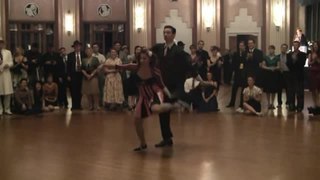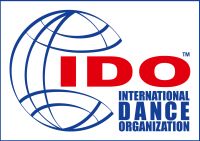
Swing dance is a group of dances that developed with the swing style of jazz music in the 1920s–1940s, with the origins of each dance predating the popular "swing era". Hundreds of styles of swing dancing were developed; those that have survived beyond that era include Lindy Hop, Balboa, Collegiate Shag, and Charleston. Today, the best-known of these dances is the Lindy Hop, which originated in Harlem in the early 1930s. While the majority of swing dances began in African American communities as vernacular African American dances, some influenced swing-era dances, like Balboa, developed outside of these communities.
The World DanceSport Federation (WDSF), formerly the International DanceSport Federation (IDSF), is the international governing body of DanceSport and Wheelchair DanceSport, as recognised by the International Olympic Committee (IOC) and the International Paralympic Committee (IPC).

Dancesport is competitive ballroom dancing, as contrasted to social or exhibition dancing. In the case of wheelchair dancesport, at least one of the dancers is in a wheelchair.
Formation dance is a style of ballroom dancing. It is pattern or shadow team dancing by couples in a formation team. The choreography may be based on a particular dance or a medley of dances. Formation dancing may be done for exhibition or for competition between teams. There is also a type of formation in Bhangra.
The World Anti-Doping Agency is a foundation initiated by the International Olympic Committee based in Canada to promote, coordinate and monitor the fight against drugs in sports. The agency's key activities include scientific research, education, development of anti-doping capacities, and monitoring of the World Anti-Doping Code, whose provisions are enforced by the UNESCO International Convention against Doping in Sport. The aims of the Council of Europe Anti-Doping Convention and the United States Anti-Doping Agency are also closely aligned with those of WADA.

Boogie-woogie is a form of swing dance and a form of blues piano playing.

Acrobatic Rock'n'Roll is a very athletic, competitive form of partner dance that originated from lindy hop. Unlike lindy hop, however, it is a choreographed dance designed for performance. It is danced by both couples and groups, either all-female or four to eight couples together. This is normally a very fast and physically demanding dance.
Swedish Dancesport Federation (DSF) administers all dancesport in Sweden. The association was formed on February 25, 1968, and is one of 68 different sports federations in Sweden. DSF became a member of the Swedish Sports Confederation (RF) in 1977, which administers all sports in Sweden. Apart from this membership Swedish Dancesport Federation also is a member of the International Dancesport Federation (IDSF) from June 19, 2011 known as the World DanceSport Federation (WDSF) and the World Rock'n'Roll Confederation (WRRC). The office lies in Farsta, Stockholm.

Wheelchair DanceSport is a partner dance competition and Dancesport where at least one of the dancers is in a wheelchair.
Miguel Angueira is an acrobatic rock'n'roll dancer from France, multiple world champion. Together with Natasha Quoy he currently holds number one place in the World Rock'n'Roll Confederation ranking list.
Bugg is a common dance style in Sweden and is very popular on the dancefloors, when dansbands play. Bugg is a four-step dance and performed at different paces. Bugg is a partner dance and follows certain basic rules, but is essentially improvised, with the woman following the man's lead. Acrobatic moves are not allowed on national or international dancecompetitions. Swedish Bugg belongs to the swing dance family and closely resembles Modern Jive.

The English Amateur Dancesport Association (EADA) Ltd is a volunteer-led organisation which represents the interests of Amateur Dancers within England. EADA provides support and training for Amateur dancers and acts as the voice of English Amateur dancers amongst other dance organisations both in the UK and overseas. EADA also aims to get the younger audience involved and on the dance floor. EADA hopes to increase the profile of dancesport.
USA Dance, formerly the United States Amateur Ballroom Dance Association (USABDA), is a national governing body for DanceSport in the United States. It is recognized as such by the World DanceSport Federation (WDSF), the U.S. Olympic Committee (USOC), and the Amateur Sports Act of the United States Congress. In addition to promoting ballroom dancing as a recreational activity, USA Dance also promotes DanceSport nationally and internationally.
"Vivat Russia!" International Open DanceSport Tournament is a dancesport tournament held on annual basis in Krasnodar region. Starting from 2007 the tournament is recognized as an international one being held in Adler, from 2009 on the tournament has been held in Sochi. The contest consists of two syllabi: Standard and Latin. Dancers that chose the first syllabus must base their routines on Waltz, Tango, Viennese Waltz, Slow Foxtrot and Quickstep. Dancers that chose the Latina syllabus must base their routines on such dances as Latina, Samba, Cha-Cha-Cha, Rumba, Paso Doble and Jive. "Vivat Russia!" is a traditional tournament of the World DanceSport Federation (WDSF). Each participant of the tournament receives rating points and takes his or her position in the world ratings based on the rank achieved. International status is the highest status available, thus couples competing at "Vivat Russia!" Tournament may potentially receive maximum possible number of points.

The International Dance Organization (IDO) is an official, independent, politically neutral, non-profit, world dance and dance sport federation, registered in Slagelse, Denmark, for Performing Arts, Street and Couple Dances. Members of the IDO are national dance federations; only non-profit organizations can join. The biggest IDO competitions, running for more than a week, are World Dance Olympiad in Moscow in the Spring and the World Show Dance and Tap Championships in Riesa in November and the World Ballet, Modern and Jazz Championships in Warsaw in December.
Double bugg is a Swedish swing dance.
The McLaren Report is the name given to an independent report released in two parts by professor Richard McLaren into allegations and evidence of state-sponsored doping in Russia. It was commissioned by the World Anti-Doping Agency (WADA) in May 2016. In July 2016, McLaren presented Part 1 of the report, indicating systematic state-sponsored subversion of the drug testing processes by the government of Russia during and subsequent to the 2014 Winter Olympics in Sochi, Russia. In December 2016, he published the second part of the report on doping in Russia.

DanceSport South Africa (DSSA), formerly the Federation of Dance Sport South Africa (FEDANSA), is the governing body for dancesport and related dance styles in South Africa. It is an full member of the world governing body World DanceSport Federation (WDSF) and recognised by SASCOC. DanceSport SA is the sole custodian and controlling body of organised dancesport in South Africa.
Systematic doping in Russian sports has resulted in 47 Olympic and tens of world championships medals being stripped from Russian competitors—the most of any country, more than four times the number of the runner-up, and more than 30% of the global total. Russia has the most competitors that have been caught doping at the Olympic Games in the world, with more than 200.







